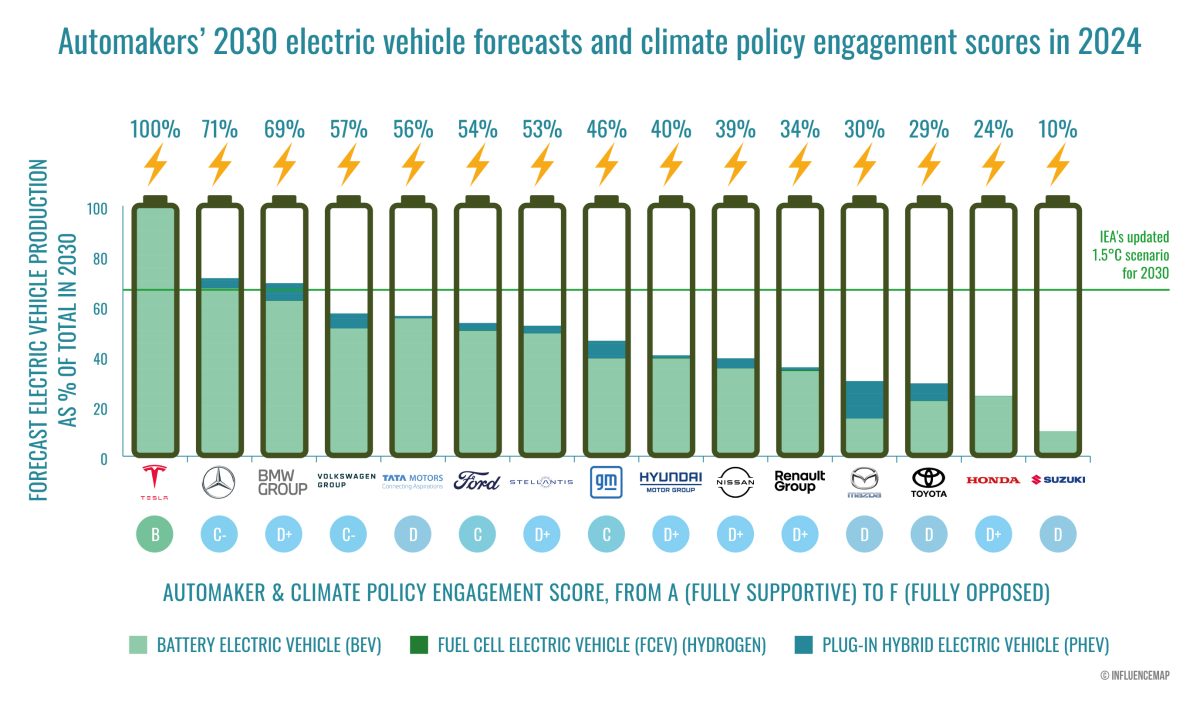INSIGHT by InfluenceMap
New InfluenceMap analysis finds that negative lobbying by the world’s largest automakers is putting global climate targets at risk and threatening the transition to electric vehicles. This report analyses the climate policy engagement strategies of fifteen of the largest global automakers in seven key regions (Australia, EU, Japan, India, South Korea, UK, US). It shows how even in countries where major climate legislation has recently passed, such as the US and Australia, the ambition of these policies has been weakened due to industry pressure.
〉All fifteen automakers, except Tesla, have actively advocated against at least one policy promoting electric vehicles. Ten of the fifteen showed a particularly high intensity of negative engagement and scored a final grade of D or D+ by InfluenceMap’s methodology. Toyota is the lowest-scoring company in this analysis, driving opposition to climate regulations promoting battery electric vehicles in multiple regions, including the US, Australia and UK. Of all automakers analyzed, only Tesla (scoring B) is found to have positive climate advocacy aligned with science-based policy.
〉The research highlights how automakers have employed their industry associations to aggressively push back on ambitious climate rules globally. For example, Australia’s New Vehicle Efficiency Standards, announced in March 2024, were watered down following intense advocacy from the Federal Chamber of Automotive Industries (FCAI). The final policy is estimated to result in a 50% reduction in emissions by 2029, rather than the 60% reduction that was initially proposed. In the US, the industry group Alliance for Automotive Innovation successfully drove calls to weaken proposed GHG emission standards. Every automaker included in the study except Tesla remains a member of at least two of these groups, with most automakers a member of at least five.

〉Only three of fifteen companies – Tesla, Mercedes Benz and BMW – are forecast to produce enough electric vehicles by 2030 to meet the International Energy Agency’s updated 1.5°C pathway of 66% electric vehicle (battery electric (BEV), fuel cell (FCEV) and plug-in hybrids (PHEVs)) sales according to InfluenceMap’s independent analysis of industry-standard data from February 2024. Current industry forecasts analyzed for this report show automaker production will reach only 53% electric vehicles in 2030. Transport is the third-largest source of greenhouse gas emissions (GHG) globally, and road transport is failing to decarbonize at anywhere near the rate of many other industries.
〉InfluenceMap’s report also finds that Japanese automakers are the least prepared for an electric vehicle transition and are engaging the hardest against it. The three lowest-scoring automakers by climate policy engagement are all Japanese (Toyota, Suzuki and Mazda), with global advocacy strategies promoting policies to lock in a longer-term role for ICE-powered vehicles, including hybrids. The four companies with the lowest forecast electric vehicle production in 2030 were also all from Japan – Suzuki at 10%, Honda at 24%, Toyota at 29% and Mazda at 30%.
〉Additionally, the analysis shows that the rapidly increasing production of larger passenger vehicles continues to threaten global climate targets. Automakers are forecast to increase SUV and light trucks production globally (from 57% of global light-duty sales in 2020 to 64% in 2030), while pushing for regulations that promote larger vehicles. With SUVs’ higher oil consumption estimated to account for one-third of total oil demand growth between 2021 and 2022, such a strategy represents a growing climate problem.
| All opinions expressed are those of the author and/or quoted sources. investESG.eu is an independent and neutral platform dedicated to generating debate around ESG investing topics.









